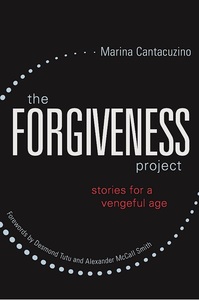In Dubai a couple of years ago I gave a talk called Forgiveness: A Moral Minefield. In it I stated that The Forgiveness Project (the organization I founded eleven years ago) didn't want to present forgiveness with sanitized images, moral platitudes or pious sounding statements. I suggested that if people felt compelled or obliged to forgive, it could feel like a veiled threat or even may come to re-victimize them. Afterwards a woman came up to me to share her story of betrayal and marital breakdown. She said friends and family had been urging her to forgive in order to move on, but she had concluded that even though she considered herself to be a 'forgiving person,' she could not reconcile, or forgive. My talk, she said, had liberated her by giving her permission not to forgive.
But not everyone is satisfied by my non-prescriptive approach. At another event in London, a man stood up at the end of my talk looking vexed. 'Your talk has challenged me' he said. I realized I had disappointed him because I hadn't talked about the miracle of forgiving, or spoken about forgiveness with the moral certainty he'd expected.
My position on forgiveness has always been nuanced. While on the one hand I believe forgiveness and reconciliation to be transformative and healing (the oil of personal relationships), on the other hand I also see it as an entirely private and personal choice, which may have limits and can be costly. The Forgiveness Project is a place of inquiry and discovery, and I'm not comfortable promoting forgiveness as something which is ethically unassailable or an imperative within psychology.
This week sees the publication of my book The Forgiveness Project: Stories for a Vengeful Age. As well as including two fascinating forewords by Archbishop Desmond Tutu and author Alexander McCall Smith, it sets out to explore this complex subject through the narratives of people who have navigated the territory. These people have taught me everything I know about forgiveness. They talk about forgiveness from multiple positions and in diverse ways; some are not even comfortable using the word forgiveness though all have dedicated their lives to drawing a line under the dogma of vengeance. Some view life through a spiritual lens, others through a psychological or political one.
I have met advocates of forgiveness who believe that those of us working in the field of forgiveness and compassion should be above the dirty cut and thrust of politics. This is a tricky one for The Forgiveness Project since the organization was born out of political motivation. I was one of a million plus people marching through London in February 2003 demanding that Tony Blair reconsider the imminent invasion of Iraq. We weren't listened to and, as a journalist, I felt compelled to start collecting counter narratives, stories of hope from victims/survivors who had sought peaceful solutions to harm, and perpetrators who had turned their aggression into a force for peace.
In the UK, for the past eleven years The Forgiveness Project has worked with prisoners, former extremists, the ex-military, as well as in divided communities abroad and so it's hard to divorce ourselves from politics when some of what we do touches on advocacy and campaigning. I once had a bruising encounter on Skype with an American social media specialist who operates visibly in the world of forgiveness and compassion. The conversation took a bizarre turn when I was told that since some of our tweets were political anyone interested in love and forgiveness would be sure to "unfollow" us as we could be perceived as "angry" or "unforgiving".
I came away realizing two things -- firstly that The Forgiveness Project's open and exploratory position on forgiveness can be challenging to some people, and secondly that the world of love, compassion and forgiveness can sometimes be a surprisingly inflexible place.
What I'm talking about here is not forgiveness itself but how we promote it, how we encourage others to think about it, and how we position ourselves around it. The conversations we have and the rhetoric we use are important so that we don't discourage those who see forgiveness as soft, weak and irrelevant, or exclude those who consider it to be solely for the strong or spiritually enlightened.
Proselytizing is dangerous because when a light becomes glaringly bright it ceases to illuminate the way ahead, instead it just blinds people.

